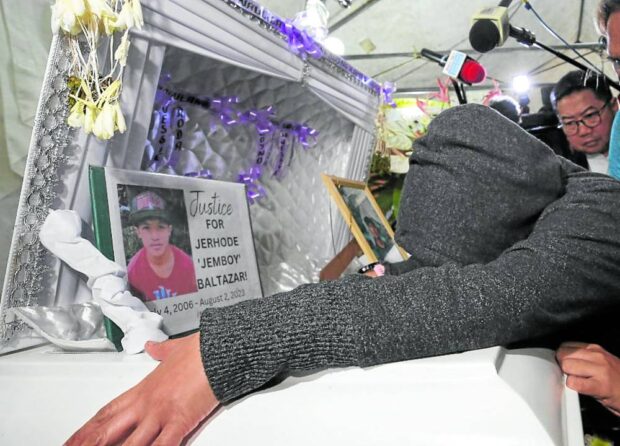
Rodaliza Baltazar, mother of Jerhode “Jemboy” Baltazar, weeps during his wake in 2023 at the family residence in Barangay NBBS Kaunlaran, Navotas City. (INQUIRER / LYN RILLON)
MANILA, Philippines — The Navotas Regional Trial Court’s sentence on the police officer convicted for the death of 17-year-old Jerhode “Jemboy” Baltazar is but a “hollow victory,” a lawyers’ group said on Wednesday.
The National Union of People’s Lawyers (NUPL) said that the court’s decision is difficult to accept, knowing that the Baltazar family lost their child forever while the police officer will only be imprisoned for a maximum of six years and four months.
“The victory feels hollow in the conviction in the case of Jemboy Baltazar because of how little the loss of life seems to be appreciated in our legal system,” NUPL Secretary General Kristina Conti told Inquirer.net in a text message.
“The decision of the Navotas trial court, while well-grounded on facts and law, is difficult to accept when the Baltazar family not only lost a child and their future, and when the policemen can carry on with their lives within the next six years,” she added.
Baltazar died on Aug. 2, 2023 after police opened fire while he was on a fishing boat with friends.
On Tuesday, the court sentenced Police Staff Sergeant Gerry Sabate Maliban to up to six years and four months imprisonment for the death of Baltazar.
Four of Maliban’s co-accused, on the other hand, were found guilty of illegal discharge of firearm.
Conti stressed that the incident highlights the ongoing challenge of holding police accountable in the Philippines.
She also pointed out the heavy burden on victims of police abuse in the country, who are tasked with proving that such offenses occurred.
“How can victims effectively prosecute when the authorities who are supposed to investigate are the ones suspected of the crime in the first place?” she asked.
Conti, who is also a legal counsel for families of the victims of the previous administration’s war on drugs, called for stronger accountability measures among police officers following the trial court’s ruling.
“We will support the Baltazar family in their quest for genuine, restorative justice and call on the police to confront not only their protocols, but their policies and practice,” she continued.

